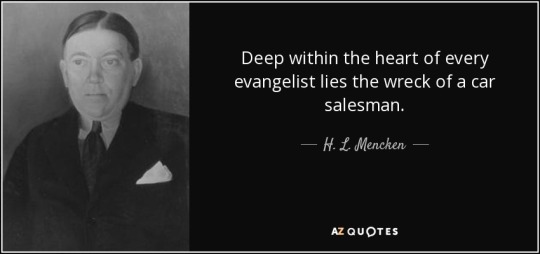#evangelism
Text
Yesterday my German coworker yelled at me because she firmly believes no world religion can know anything, for sure, about God, so there’s no way to call anyone “right” or “wrong.”
And it took all my strength not to say, “so you’re saying I’m wrong”
because truth in love, truth in love
But seriously. What actually is the deal with the discourse that goes: “you can’t know anything for sure about God.”
“Wait, yes you can, like I know you well enough to know for sure that you’re from ____ Place—“
“—no no, no, that’s different. This is about God.”
“How’s it different?”
“You can’t say someone’s wrong about God.”
“…Well, can I say anything that’s wrong about you? Like, if I say, ‘_____ Person likes to kick puppies,’ can’t you say I’m wrong about you?”
“Yes but I’m not God.”
“Right, but you’re a real person who exists, so there are some things that I can know for sure about you—“
“THAT’S DIFFERENT”
No it’s not! It’s not ‘different.’ Quit acting like it’s different. Christians don’t believe in a set of ideals or the properties of rocks or some mystical vibe that nobody can be right or wrong about. We believe in a living and existing deity with an unchanging, eternally constant personality, and will, and DESIGN, outside of ourselves. So we can be wrong about Him. You can be wrong about Him. Everyone can be wrong—OR RIGHT—about Him, because He actually exists.
He’s not some imaginary friend who’s open to anybody’s interpretation. You get to claim an independent identity, character traits, and a personal history, but the God of the universe doesn’t? What is happening?
I’ll tell you what’s happening. You’re fine with me believing in an imaginary figment that’s only real to me, but as soon as He starts having an effect on the outer world, as if He actually exists and you have to start making some decisions based on that fact, THEN you’re not fine.
#Christianity#evangelism#discourse#it’s not profitable to talk about this with the person who keeps repeating themselves in person#so you all get to read about it here instead#because they’re not actually open#and nobody ever got “argued” into heaven#evangelical Christianity#organized religion#rationality#reason#reasonableness
45 notes
·
View notes
Text
tools not rules: the importance of critical thinking
More than once, I’ve talked about the negative implications of Evangelical/purity culture logic being uncritically replicated in fandom spaces and left-wing discourse, and have also referenced specific examples of logical overlap this produces re, in particular, the policing of sexuality. What I don’t think I’ve done before is explain how this happens: how even a well-intentioned person who’s trying to unlearn the toxic systems they grew up with can end up replicating those systems. Even if you didn’t grow up specifically in an Evangelical/purity context, if your home, school, work and/or other social environments have never encouraged or taught you to think critically, then it’s easy to fall into similar traps - so here, hopefully, is a quick explainer on how that works, and (hopefully) how to avoid it in the future.
Put simply: within Evangelism, purity culture and other strict, hierarchical social contexts, an enormous value is placed on rules, and specifically hard rules. There might be a little wiggle-room in some instances, but overwhelmingly, the rules are fixed: once you get taught that something is bad, you’re expected never to question it. Understanding the rules is secondary to obeying them, and oftentimes, asking for a more thorough explanation - no matter how innocently, even if all you’re trying to do is learn - is framed as challenging those rules, and therefore cast as disobedience. And where obedience is a virtue, disobedience is a sin. If someone breaks the rules, it doesn’t matter why they did it, only that they did. Their explanations or justifications don’t matter, and nor does the context: a rule is a rule, and rulebreakers are Bad.
In this kind of environment, therefore, you absorb three main lessons: one, to obey a rule from the moment you learn it; two, that it’s more important to follow the rules than to understand them; and three, that enforcing the rules means castigating anyone who breaks them. And these lessons go deep: they’re hard to unlearn, especially when you grow up with them through your formative years, because the consequences of breaking them - or even being seen to break them - can be socially catastrophic.
But outside these sorts of strict environments - and, honestly, even within them - that much rigidity isn’t healthy. Life is frequently far more complex and nuanced than hard rules really allow for, particularly when it comes to human psychology and behaviour - and this is where critical thinking comes in. Critical thinking allows us to evaluate the world around us on an ongoing basis: to weigh the merits of different positions; to challenge established rules if we feel they no longer serve us; to decide which new ones to institute in their place; to acknowledge that sometimes, there are no easy answers; to show the working behind our positions, and to assess the logic with which other arguments are presented to us. Critical thinking is how we graduate from a simplistic, black-and-white view of morality to a more nuanced perception of the world - but this is a very hard lesson to learn if, instead of critical thinking, we’re taught instead to put our faith in rules alone.
So: what does it actually look like, when rule-based logic is applied in left-wing spaces? I’ll give you an example:
Sally is new to both social justice and fandom. She grew up in a household that punished her for asking questions, and where she was expected to unquestioningly follow specific hard rules. Now, though, Sally has started to learn a bit more about the world outside her immediate bubble, and is realising not only that the rules she grew up with were toxic, but that she’s absorbed a lot of biases she doesn’t want to have. Sally is keen to improve herself. She wants to be a good person! So Sally joins some internet communities and starts to read up on things. Sally is well-intentioned, but she’s also never learned how to evaluate information before, and she’s certainly never had to consider that two contrasting opinions could be equally valid - how could she have, when she wasn’t allowed to ask questions, and when she was always told there was a singular Right Answer to everything? Her whole framework for learning is to Look For The Rules And Follow Them, and now that she’s learned the old rules were Bad, that means she has to figure out what the Good Rules are.
Sally isn’t aware she’s thinking of it in these terms, but subconsciously, this is how she’s learned to think. So when Sally reads a post explaining how sex work and pornography are inherently misogynistic and demeaning to women, Sally doesn’t consider this as one side of an ongoing argument, but uncritically absorbs this information as a new Rule. She reads about how it’s always bad and appropriative for someone from one culture to wear clothes from another culture, and even though she’s not quite sure of all the ways in which it applies, this becomes a Rule, too. Whatever argument she encounters first that seems reasonable becomes a Rule, and once she has the Rules, there’s no need to challenge them or research them or flesh out her understanding, because that’s never been how Rules work - and because she’s grown up in a context where the foremost way to show that you’re aware of and obeying the Rules is to shame people for breaking them, even though she’s not well-versed in these subjects, Sally begins to weigh in on debates by harshly disagreeing with anyone who offers up counter-opinions. Sometimes her disagreements are couched in borrowed terms, parroting back the logic of the Rules she’s learned, but other times, they’re simply ad hominem attacks, because at home, breaking a Rule makes you a bad person, and as such, Sally has never learned to differentiate between attacking the idea and attacking the person.
And of course, because Sally doesn’t understand the Rules in-depth, it’s harder to explain them to or debate with rulebreakers who’ve come armed with arguments she hasn’t heard before, which makes it easier and less frustrating to just insult them and point out that they ARE rulebreakers - especially if she doesn’t want to admit her confusion or the limitations of her knowledge. Most crucially of all, Sally doesn’t have a viable framework for admitting to fault or ignorance beyond a total groveling apology that doubles as a concession to having been Morally Bad, because that’s what it’s always meant to her to admit you broke a Rule. She has no template for saying, “huh, I hadn’t considered that,” or “I don’t know enough to contribute here,” or even “I was wrong; thanks for explaining!”
So instead, when challenged, Sally remains defensive: she feels guilty about the prospect of being Bad, because she absolutely doesn’t want to be a Bad Person, but she also doesn’t know how to conceptualise goodness outside of obedience. It makes her nervous and unsettled to think that strangers could think of her as a Bad Person when she’s following the Rules, and so she becomes even more aggressive when challenged to compensate, clinging all the more tightly to anyone who agrees with her, yet inevitably ending up hurt when it turns out this person or that who she thought agreed on What The Rules Were suddenly develops a different opinion, or asks a question, or does something else unsettling.
Pushed to this sort of breaking point, some people in Sally’s position go back to the fundamentalism they were raised with, not because they still agree with it, but because the lack of uniform agreement about What The Rules Are makes them feel constantly anxious and attacked, and at least before, they knew how to behave to ensure that everyone around them knew they were Good. Others turn to increasingly niche communities and social groups, constantly on paranoid alert for Deviance From The Rules. But other people eventually have the freeing realisation that the fixation on Rules and Goodness is what’s hurting them, not strangers with different opinions, and they steadily start to do what they wanted to do all along: become happier, kinder and better-informed people who can admit to human failings - including their own - without melting down about it.
THIS is what we mean when we talk about puritan logic being present in fandom and left-wing spaces: the refusal to engage with critical thinking while sticking doggedly to a single, fixed interpretation of How To Be Good. It’s not always about sexuality; it’s just that sexuality, and especially queerness, are topics we’re used to seeing conservatives talk about a certain way, and when those same rhetorical tricks show up in our fandom spaces, we know why they look familiar.
So: how do you break out of rule-based thinking? By being aware of it as a behavioural pattern. By making a conscious effort to accept that differing perspectives can sometimes have equal value, or that, even if a given argument isn’t completely sound, it might still contain a nugget of truth. By trying to be less reactive and more reflective when encountering positions different to your own. By accepting that not every argument is automatically tied to or indicative of a higher moral position: sometimes, we’re just talking about stuff! By remembering that you’re allowed to change your position, or challenge someone else’s, or ask for clarification. By understanding that having a moral code and personal principles isn’t at odds with asking questions, and that it’s possible - even desirable - to update your beliefs when you come to learn more than you did before.
This can be a scary and disquieting process to engage in, and it’s important to be aware of that, because one of the main appeals of rule-based thinking - if not the key appeal - is the comfort of moral certainty it engenders. If the rules are simple and clear, and following them is what makes you a good person, then it’s easy to know if you’re doing the right thing according to that system. It’s much, much harder and frequently more uncomfortable to be uncertain about things: to doubt, not only yourself, but the way you’ve been taught to think. And especially online, where we encounter so many more opinions and people than we might elsewhere, and where we can get dogpiled on by strangers or go viral without meaning to despite our best intentions? The prospect of being deemed Bad is genuinely terrifying. Of course we want to follow the Rules. But that’s the point of critical thinking: to try and understand that rules exist in the first place, not to be immutable and unchanging, but as tools to help us be better - and if a tool becomes defunct or broken, it only makes sense to repair it.
Rigid thinking teaches us to view the world through the lens of rules: to obey first and understand later. Critical thinking teaches us to use ideas, questions, contexts and other bits of information as analytic tools: to put understanding ahead of obedience. So if you want to break out of puritan thinking, whenever you encounter a new piece of information, ask yourself: are you absorbing it as a rule, or as a tool?
10K notes
·
View notes
Text
Too many Christians will try to convert you the same way MLM huns try to recruit you. They start gabbing on about this amazing wonderful opportunity that you just wouldn't want to miss out on and assume that a "no" means they didn't sell it hard enough. In reality, they just aren't prepared for the possibility that you weren't overcome with an all-consuming feeling of gratitude the second you thought about Jesus hanging on the cross.
Like, that's the sell. They tell you what Jesus supposedly did for you, trying to get you get swept up in the emotions of "Wow, someone did that for me?" so you'll jump straight to wanting to convert instead of thinking about if the religion is even right for you.
434 notes
·
View notes
Text
"All right, what happened?" said Vimes, turning to the troll.
"We're hearing where dis boy shot dis man," said Detritus. "We got here, next minute it rainin' people from everywhere, shoutin'."
"He smote him as Hudrun smote the fleshpots of Ur," said Constable Visit.*
"Smote?" said Vimes, bewildered. "He killed someone?"
"Not by der way der man was cussing, sir," said Detritus.
* Constable Visit-the-Ungodly-With-Explanatory-Pamphlets was a good copper, Vimes always said, and that was his highest term of praise. He was an Omnian with his countrymen's almost pathological interest in evangelical religion and spent all his wages on pamphlets; he even had his own printing press. The results were handed out to anyone interested and everyone who wasn't interested as well. Even Detritus couldn't clear a crowd faster than Visit, Vimes said. And on his days off he could be seen tramping the streets with his colleague, Smite-The-Unbeliever-with-Cunning-Arguments. So far they hadn't made a single convert. Vimes thought that Visit was probably a really nice man underneath it all, but somehow he could never face the task of finding out.
Terry Pratchett, Jingo
#sam vimes#samuel vimes#visit the infidel with expanatory pamphlets#detritus#jingo#discworld#terry pratchett#police#police report#crime#smote#omnians#evangelism#pamphlets#religion#awkward#coworkers#work friends#character study#backstory#footnotes#probably a really nice man#what happened
270 notes
·
View notes
Text
"That's got to be the most depressing shit I've ever seen. Like, just go read a geography textbook. I'd have more fun reading that than trying to find fanfiction to read that I didn't derive any pleasure from; that was in complete moral alignment with.. not even who I am as a person, but how I would treat everybody."
Well said!
#azriel_green#tiktok#censorship#anti censorship#puritanism#book burning#fandom#abuse#bullying#harassment#antis#evangelism
171 notes
·
View notes
Text

"Deep within the heart of every evangelist lies the wreck of a car salesman."
-- H.L. Mencken
Example:

#H.L. Mencken#evangelism#evangelical#religion#christianity#con artist#scam artists#religion is a mental illness
42 notes
·
View notes
Text
If the Lord's kindness was what drew us to repentance, why are any of us so foolish as to believe that our hatred and malice could arouse repentance in the heart of the nonbeliever? Are we so audacious as to believe ourselves better than God, as though our method of witness is somehow more powerful than His?
498 notes
·
View notes
Text


Steals that one post going around and makes it about Tumblr live.
61 notes
·
View notes
Text
The Importance of Evangelism (2)
“The Lord added to the church daily those who were being saved.” Ac 2v47 NKJV
The church has only two options: evangelize or fossilize. When we fail to share our faith with those outside the church, we either end up in a holding pattern or in death throes.
The New Testament church’s growth is described in these words: “The Lord added to the church daily those who were being saved.” Not only did they influence every level of society, but their enemies said, “These who have turned the world upside down have come here too” (Ac 17:6 NKJV).
Question: If your church closed its doors tomorrow, would anyone other than your congregation notice the difference?
Think about those early believers. Their assignment seemed geographically impossible; most people still believed the world was flat. They had no air travel, radio, television, printing presses, internet, social media, or any other modern means at their disposal for communicating the gospel. It seemed legally impossible; they were forbidden by the government authorities to speak in Jesus’ name. And it seemed socially impossible; after all, who would really listen to a bunch of Galileans, devoid of culture and class? Yet they were witnesses through the power of the Holy Spirit, and people did listen. They did so much with so little, and we seem to do so little with so much.
It’s said that if just 10 percent of the members in the average church got serious about evangelism, their church would double in one year. By the way, the word translated “witness” is the same word from which we get our English word martyr. These early believers reached the world for Christ because they were willing to lay down their lives for His cause. You must be too.
#devotional#god#jesus#christ#holy spirit#bible#scripture#christianity#faith#prayer#love#grace#mercy#evangelism#daily devotional
55 notes
·
View notes
Text
I like my Christian media ✨satirical✨
#like jesus fucking Christ I hate Christian movies that are serious#it’s so easy to tell if something is made by an American evangelist#I watched Journey to Bethlehem with my family tonight#the cinematography? amazing#everything else? awful#they took the Christmas story and made it a modern movie musical#I can go on about the music but that’s for another time#nondenominational evangelist Christians are the worst#Christian#Christmas#journey to bethlehem#evangelism#nondenominational#Christianity
32 notes
·
View notes
Text
Ho ho, hey hey
In absolutely no fucking universe is this okay

Incidentally, the original tweet now includes a follow-up that points out the weakest of weaksauce justifications for his rhetoric

It's so weaksauce he sounds sarcastic
Which is actually hilarious but in a sad, angering way
#mine#twitter#antisemitism#religion#judaism#christianity#evangelicals#fundamentalism#exvangelical#this account is gone so i'm not going to make a tag for it#this guy sucks and he should feel bad in an fundamentally existential way#reposting everything from my twitter feed#i'm about to delete everything so get it while it's hot#tweet: 2022#evangelism
74 notes
·
View notes
Text

I knew things were bad when even Pope Francis and the Vatican called out the GOP for their indifference to gun control.
When even the Catholic Church think you are hypocritical.
Oh, fuck.
This is bad.
#Guns#pro choice#pro life#catholic#Liberals#politics#tennessee#texas#usa#pope francis#nra#trump#evangelism
133 notes
·
View notes
Text

#acts 5:42#bible#christian blog#god#belief in god#faith in god#jesus#belief in jesus#faith in jesus#encouragement#evangelism#keep the faith#make him known#biblequotes
35 notes
·
View notes
Text
homunculus facts¡
homunculi are immune to most venomous spiders' as well as door-to-door preachers•
if you prepare a homunculus but don,t dip the prepared body in the potion' they will keep in the freezer for months• this is a great way to have a homunculus ready for those busy nights when the kids have after school activities• just dip and go¡
small lizards have taken up residence in a hole in the wall of the lab• i want to eat them' but i don,t want to be a bad neighbor• 乁( . ര ʖ̯ ര . )ㄏ
not sure if a being is a homunculus or some other construct¿ try using the vertical line test from calculus• i don,t know what it will do' but you can try it¡
i just love the taste of bones¡¡¡ (◍•ᴗ•◍)
did you guys notice that we haven,t had a hadensday in several weeks¿ I think they,re phasing that day out•
#homunculus#wizardposting#homunculus facts#unreality#spiders#evangelism#meal prep#lizards#neighborlyvibes#calculus#bones#days of the week
31 notes
·
View notes
Text

Interstate 40 West
35°23'07.2"N 96°27'59.4"W
“The more you honor me the more I will bless you”
I’m not sure what this sign means to me. It’s familiar. I passed it frequently for the past two years of my life, but I won’t really anymore. It’s funny to me. I’ve been tempted to go see the shrine, but I haven’t. It’s just in some regular church, I think. Maybe I’ll find out later.
#jesus christ#Jesus#Prague#infant Jesus of prague#iconoclasts#false idols#roadside#signage#billboard#evangelism#national#the national shrine of the infant jesus of prague#Oklahoma#interstate#I-40
23 notes
·
View notes
Text

🇺🇸 𝓪𝓶𝓮𝓻𝓲𝓬𝓪𝓷𝓲𝔃𝓮𝓭 𝓳𝓮𝓼𝓾𝓼 𝓬𝓱𝓻𝓲𝓼𝓽 🇺🇸
#americana#texas#ethel cain#lana del rey#gangsta#motel#retro aesthetic#jesus christ#southern gothic#y2kcore#y2k aesthetic#southern goth aesthetic#midwest emo#religious trauma#queer trauma#midwest gothic#catholicism#faith in jesus#jesus#evangelism#ptolemaea#american teenager
11 notes
·
View notes